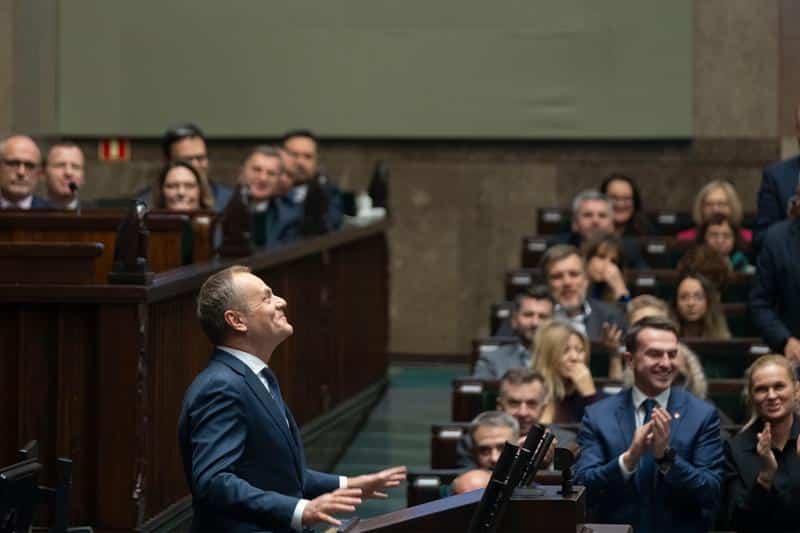100 days is decidedly too short a time period to prepare and implement all the changes expected by entrepreneurs. The biggest success of the government so far seems to be the unblocking of funds from the KPO (Operational Programme Knowledge Education Development), granting the promised pay raises to teachers and the budget sector, and the commencement of changes in the justice system, aimed at restoring the rule of law principles.
Yesterday, the government also introduced a very reasonable health insurance premium reduction, beneficial for 93% of entrepreneurs. It also unveiled changes it aims to implement in the National e-Invoicing System, which were also expected and well received by businesses.
We are very pleased with the reactivation of dialogue with entrepreneurs. Representatives of many departments declare that they will not change law without the opinions of entrepreneurs. The government has also prepared the first deregulation package, which includes, among others, a break from ZUS (Social Insurance Institution), shortening of inspection times for micro-enterprises and extending the vacatio legis period for entrepreneurs.
Entrepreneurial optimism is boosted by the gradual warming of relations with the European Union, which increases the possibility of EU funds flowing to Poland. Businesses, however, are waiting for further decisions that will guarantee more freedom and security for Polish entrepreneurship, says Maciej Witucki, president of the Confederation Lewiatan.
Experts from Lewiatan on Donald Tusk’s government’s first 100 days:
Robert Lisicki, director of the labour department: It’s too short a period to expect fundamental changes that we could feel in the job market. The Minister of Family, Labour and Social Policy has introduced initiatives for this year, i.e. the finale of work on a law on reporting legal breaches, a law expanding the application of collective agreements or a new law concerning the minimum wage. At the EU level, the government backed a directive draft concerning platform workers, which could signal an overhaul of the Labour Code. Work has started on migration policy, which affects the employment of foreigners.
Adrian Zwoliński, director of the department of the financial market and corporate law: We positively assess announcements of simplifying the civil partnership. The project hasn’t yet reached the Sejm floor, but it anticipates simplifying the creation of a civil partnership as well as making the information about it more transparent. We also rate the full digitalisation of the leasing contract positively, which reduces the transaction costs of concluding and modifying leasing agreements. The project has not yet reached the Sejm. We negatively assess loan holidays, which the Sejm is now dealing with. It’s an extraordinary solution that the macroeconomic situation doesn’t justify, and which poses risks of both economic and social costs.
Kacper Olejniczak, director of the health protection and Life Sciences sector department: It’s good that the new leadership of the Ministry of Health characterised the first 100 days of government in the health protection area with openness and dialogue. The amendment of the Polish Oncological Network law is significant as it pushes back the implementation of the network by a year.
The preparation of two Polish drug lists – drugs manufactured in Poland and drugs made with an active substance produced in the country – is important for the pharmaceutical industry. The announcement of an amendment to the refund law, whose provisions in many areas create significant difficulties when it comes to their application, is also pleasing.
Jakub Safjański, director of the department of energy and climate change: Entrepreneurs are pleasantly observing the declarations and actual actions of the climate and environment and development and technologies departments towards building a culture of dialogue and jointly working out regulatory solutions. It is a significant change compared to the previous government.
The process of changes in the deposit system, requested by entrepreneurs, has started. Some of their comments have been taken into account. Unfortunately, the most important proposal to delay the launch of the system by a year has not been considered. Intense work is ongoing on the amendment to the windmill law – according to announcements it is to be changed by the end of June. The ministry has also announced generous support from the Modernisation Fund for the development of micro wind installations, against the appeals of experts (including Lewiatan) to first examine the maturity, barriers and potential of this technology.
Przemysław Pruszyński, director of the tax department: 100 days is definitely not enough time to prepare and enact tax law changes expected by entrepreneurs. But we rate the government’s initial actions positively. The decision was made to postpone the introduction of the National e-Invoicing System and put these revolutionary changes through social consultations again.
Legislative projects are being prepared that introduce so-called cash PIT for the smallest businesses, the tax-free amount in the Belka tax and contribution holidays, which fulfills promises made to entrepreneurs during the election campaign. The ministries of finance and health have presented a proposal for lowering the health insurance contribution, beneficial for entrepreneurs. This is undoubtedly the most important promise given to entrepreneurs and will have a significant impact on assessing the fulfillment of the government’s election pledges.
